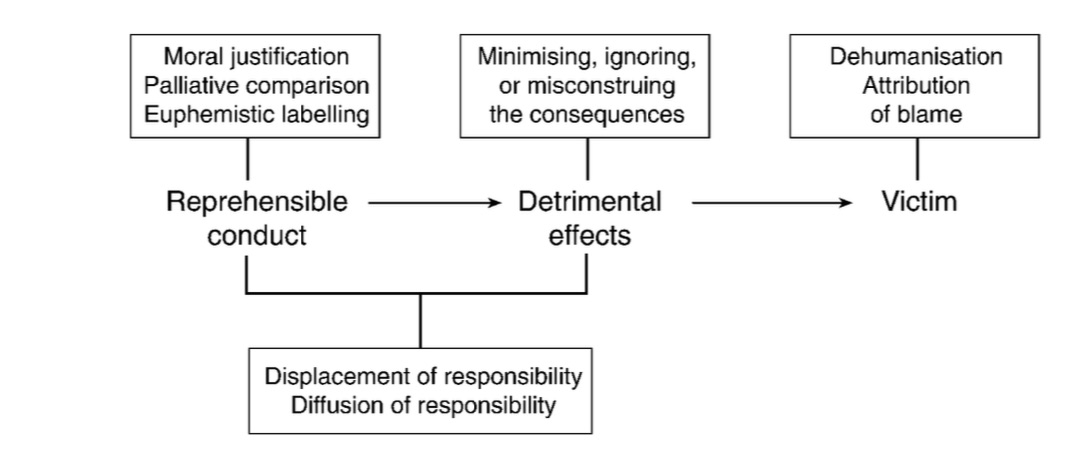Moral Disengagement: The Theory
Moral disengagement occurs when self-sanctions are disengaged from inhumane conduct. It enables people to do wrong and feel good.
If the video isn’t working you could also watch it on youtube. Or you can view just the slides (no audio or video).
This recording is also available on stream (no ads; search enabled).
If the slides are not working, or you prefer them full screen, please try this link. The recording is available on stream and youtube.
Notes
To understand moral disengagement, we need to consider the theory, the evidence which supports it and its significance for understanding humans’ ethical abilities. Start with the theory.
Bandura, who is responsible for introducing the notion of moral disengagement, offers a conjecture about self-regulation:
‘individuals adopt standards of right and wrong [and they] monitor their conduct and the conditions under which it occurs, judge it in relation to their moral standards and perceived circumstances, and regulate their actions by the consequences they apply to themselves’ (Bandura, 2002, p. 102).
The upshot of self-regulation is that people constrain themselves not to violate their own moral standards. (As Bandura puts it, ‘It is through the ongoing exercise of evaluative self-influence that moral conduct is motivated and regulated’ (Bandura, 2002, p. 102).)
This self-regulation will sometimes prevent people from getting things they want. But people can anticipate the effects of self-regulation and work around them:
‘In the face of situational inducements to behave in inhumane ways, people can choose to behave otherwise by exerting self-influence’ (Bandura, 2002, p. 102).
This ‘self-influence’ amounts to construing actions which would otherwise be incompatible with an individual’s standards of right and wrong in ways that avoid the incompatibility. In effect, self-regulation is anticipatorily derailed.
This is moral disengagement: the derailing of self-regulation to allow actions which would violate one’s own standards of right and wrong.
Bandura postulates eight processes by which moral disengagement can occur:
‘The disengagement may centre on redefining harmful conduct as honourable by moral justification, exonerating social comparison and sanitising language. It may focus on agency of action so that perpetrators can minimise their role in causing harm by diffusion and displacement of responsibility. It may involve minimising or distorting the harm that follows from detrimental actions; and the disengagement may include dehumanising and blaming the victims of the maltreatment’ Bandura (2002, p. 103).
Their operation is depicted in the figure:
 Figure: A model of eight mechanisms of moral disengagement Source: Bandura (2002, p. figure 1)
Figure: A model of eight mechanisms of moral disengagement Source: Bandura (2002, p. figure 1)
Reason plays a role in most, if not all, of these processes. It is central to Moral Justification, Displacement of Responsibility and Attribution of Blame. So if moral disengagement is responsible for a moral judgement or action, it is likely that reasoning will have played a causal role in arriving at the judgement or action.
What evidence motivates accepting Bandura’s theory?
Glossary
According to Sinnott-Armstrong, Young, & Cushman (2010, p. 256), moral intuitions are ‘strong, stable, immediate moral beliefs.’